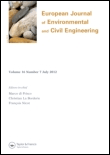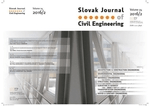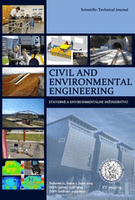
CANADIAN JOURNAL OF CIVIL ENGINEERING
Scope & Guideline
Advancing Civil Engineering Knowledge Since 1971
Introduction
Aims and Scopes
- Structural Engineering:
Research on the design, analysis, and performance of various structural systems, including traditional and advanced materials, innovative construction techniques, and resilience against natural hazards. - Sustainable Infrastructure:
Studies exploring sustainable practices in civil engineering, including the utilization of recycled materials, energy-efficient designs, and the environmental impact of construction practices. - Transportation Engineering:
Investigations into traffic management, transportation systems, and the safety and efficiency of road networks, including the integration of advanced technologies such as AI and machine learning. - Geotechnical Engineering:
Research on soil behavior, foundation design, and the interaction between soil and structures, emphasizing the importance of geotechnical considerations in civil engineering projects. - Water Resources Engineering:
Studies focusing on the management and utilization of water resources, including hydrology, flood modeling, and the impact of climate change on water systems. - Construction Management:
Research on project management techniques, construction safety, labor productivity, and the integration of digital tools in construction processes. - Materials Science:
Exploration of advanced materials used in civil engineering, including the development and testing of concrete, asphalt, and alternative materials for improved performance and sustainability. - Environmental Engineering:
Research addressing the environmental aspects of civil engineering, including waste management, pollution control, and the impact of infrastructure on ecosystems.
Trending and Emerging
- Digital Transformation in Civil Engineering:
There is a growing emphasis on the integration of digital technologies, such as Building Information Modeling (BIM), AI, and machine learning, to enhance project efficiency, safety, and sustainability. - Climate Change Resilience:
Research focusing on the resilience of infrastructure to climate change impacts has gained momentum, addressing issues like extreme weather events, flooding, and the sustainability of materials. - Smart Transportation Systems:
The emergence of smart transportation solutions, including the use of connected and autonomous vehicles, has become a focal point, with studies examining their implications for traffic management and infrastructure. - Sustainable Materials and Recycling:
There is an increasing trend towards researching sustainable materials, including recycled aggregates and alternative binders, to minimize the environmental footprint of construction. - Health and Safety in Construction:
The importance of health and safety measures in construction practices is gaining attention, with studies aimed at improving worker safety and reducing accidents through innovative practices. - Public Engagement and Community Impact:
Research exploring the social dimensions of civil engineering, including community engagement and public perception of infrastructure projects, is emerging as a significant theme.
Declining or Waning
- Traditional Construction Methods:
Research related to conventional construction practices has diminished as the industry moves towards innovative and sustainable techniques, such as modular construction and the use of advanced materials. - Non-structural Components:
There has been a noticeable decline in studies focusing on non-structural components in civil engineering, possibly overshadowed by the growing emphasis on structural integrity and resilience. - Hydraulic Engineering:
Research specifically targeting hydraulic engineering aspects, such as traditional dam design and maintenance, has waned, likely due to increased focus on integrated water resource management and environmental impacts. - Historical Preservation Techniques:
The exploration of traditional methods for historical preservation has become less prominent, as contemporary practices focus more on sustainability and modern materials. - Manual Data Collection Techniques:
As technology advances, manual data collection methods in civil engineering studies are being replaced by automated systems and digital tools, leading to a decline in related research.
Similar Journals

Civil Engineering Journal-Stavebni Obzor
Innovative Research, Unbound by BarriersWelcome to the Civil Engineering Journal-Stavebni Obzor, an esteemed academic publication dedicated to advancing the field of civil engineering. Published by the Czech Technical University in Prague, Faculty of Civil Engineering, this journal has provided a platform for innovative research and critical discourse since its inception. With an ISSN of 1210-4027 and an E-ISSN of 1805-2576, this Open Access journal has been facilitating wide dissemination of knowledge in civil engineering since 2014, ensuring that valuable research reaches a global audience without barriers. The journal is committed to fostering collaboration among researchers, professionals, and students, encouraging the exchange of ideas that drive the discipline forward. Its diverse scope encompasses various aspects of civil engineering, making it an essential resource for anyone looking to stay at the forefront of this dynamic field. Located in Prague, a hub of engineering excellence, this journal not only reflects the latest trends and innovations but also contributes to shaping the future of civil engineering.

Turkish Journal of Civil Engineering
Elevating Standards in Civil and Structural EngineeringWelcome to the Turkish Journal of Civil Engineering, a pioneering publication under the auspices of the TURKISH CHAMBER OF CIVIL ENGINEERS, dedicated to advancing the field of civil engineering and construction. With a focus on cutting-edge research and innovative practices, this journal seeks to provide a platform for scholars, professionals, and students to share their findings and insights within the sphere of civil and structural engineering. The journal is committed to open access, ensuring that research is readily available to a global audience. As it embarks on its journey from 2023 to 2024, it aims to enhance its reputation as a vital resource within the academic community, currently ranking in the 40th percentile for Building and Construction Engineering and 32nd for Civil and Structural Engineering in Scopus. We encourage contributions that push the boundaries of engineering knowledge, fostering collaboration and progress in this essential field.

European Journal of Environmental and Civil Engineering
Transforming Knowledge into Action for a Sustainable Built EnvironmentThe European Journal of Environmental and Civil Engineering, published by Taylor & Francis Ltd, is a prestigious peer-reviewed journal that serves as a vital platform for advancing knowledge in the fields of Civil and Structural Engineering as well as Environmental Engineering. With an impressive impact factor and categorized in the Q2 quartile for both engineering fields, this journal occupies a significant position in the scholarly community. Its focused scope encompasses innovative research, case studies, and practical applications that address contemporary environmental and infrastructural challenges. Researchers, professionals, and students alike benefit from the journal's commitment to high-quality discourse, as evidenced by its Scopus rankings, which place it in the top 30% in Civil and Structural Engineering and the top 40% in Environmental Engineering. Through the publication of cutting-edge studies and a commitment to fostering interdisciplinary dialogue, the European Journal of Environmental and Civil Engineering remains an essential resource for those dedicated to improving our built environment and safeguarding our natural resources.

Slovak Journal of Civil Engineering
Driving knowledge-sharing for contemporary engineering challenges.Welcome to the Slovak Journal of Civil Engineering, a premier open-access publication dedicated to advancing the field of civil engineering. Published by SCIENDO, this journal has been providing a platform for the dissemination of groundbreaking research since 2010, ensuring that all articles are freely accessible to a global audience. With a commitment to promoting innovation and excellence within civil engineering, the journal covers a wide range of topics, including structural engineering, transportation systems, geotechnics, and environmental engineering. The Slovak Journal of Civil Engineering is designed to engage a diverse community of researchers, professionals, and students, fostering collaboration and knowledge-sharing to address contemporary challenges in the field. With its open-access model, the journal not only enhances visibility for authors but also ensures that the latest findings and methodologies reach practitioners and academics alike, making it an essential resource for anyone interested in civil engineering advancements. Stay connected with the evolving landscape of civil engineering through this influential publication.

Civil and Environmental Engineering
Advancing knowledge for sustainable infrastructure.Civil and Environmental Engineering, published by SCIENDO, is a prominent open-access journal dedicated to advancing research and knowledge in the fields of civil and structural engineering, as well as environmental engineering. Since its inception in Germany, it has been committed to promoting cutting-edge studies and methodologies that address the pressing challenges in these domains. With an ISSN of 1336-5835 and E-ISSN of 2199-6512, the journal is accessible to a global audience, having adopted an open-access policy since 2014 to enhance the visibility and dissemination of scholarly work. The journal currently holds a Q3 ranking in both Civil and Structural Engineering and Environmental Engineering, as of 2023, reflecting its growing influence within the academic community. It operates within a framework of rigorous peer-review standards and encourages contributions that not only contribute to theoretical advancements but also have practical implications for real-world applications. Researchers, professionals, and students alike will find invaluable insights and innovative perspectives in the latest studies published from 2018 to 2024.

Infrastructures
Driving Progress in Civil and Structural EngineeringInfrastructures is a distinguished open-access journal, published by MDPI since 2016, dedicated to advancing the fields of engineering and construction through interdisciplinary research and critical insights. Based in Switzerland, it serves a global community of scholars and professionals, providing a platform for innovative studies that drive progress in Building and Construction, Civil and Structural Engineering, Computer Science Applications, Geotechnical Engineering and Engineering Geology, and various aspects of Materials Science. With an impressive impact factor and a positioning in the Q2 category across multiple engineering fields, the journal's robust ranking reflects its commitment to high-quality research, with notable Scopus rankings showcasing its significant contribution to academic discourse. Infrastructures not only facilitates open access to essential knowledge but also aims to bridge the gap between theory and practical application, making it an invaluable resource for researchers, industry professionals, and students alike.

Bauingenieur
Shaping the Future of Building and Construction EngineeringBauingenieur, an established journal in the field of Building and Construction and Civil and Structural Engineering, has been a significant platform for scholarly discourse since its inception in 1969. Published by VDI FACHMEDIEN GMBH & CO KG UNTERNEHMEN FACHINFORMATIONEN in Germany, this journal, available in both print (ISSN: 0005-6650) and electronic formats (E-ISSN: 1436-4867), serves as a vital resource for researchers, professionals, and students dedicated to advancing knowledge and practice in engineering. Although currently without open access options, Bauingenieur aspires to contribute to the academic community by presenting cutting-edge research, case studies, and technical reviews within the realms of construction and civil engineering. As evidenced by its categorizations in the 2023 Scopus rankings, where it has a Q4 designation in both relevant categories, it provides an essential resource for understanding current trends and challenges in the industry. The journal welcomes contributions that push the boundaries of knowledge and foster innovative solutions in the built environment.

JOURNAL OF COLD REGIONS ENGINEERING
Driving Innovation in Civil Engineering for Cold ClimatesJOURNAL OF COLD REGIONS ENGINEERING, published by the ASCE-American Society of Civil Engineers, is a premier platform for disseminating innovative research in the field of cold regions engineering. Since its inception in 1987, the journal has been at the forefront of advancing the understanding of engineering challenges and solutions in cold climate contexts, which are critical for civil and environmental engineering practices. With its presence in both Geotechnical Engineering and Industrial and Manufacturing Engineering categories, the journal has achieved a commendable Q2 ranking in various Scopus classifications, signifying its robust contribution to academia and the industry. Researchers and professionals benefit from the journal's rigorously peer-reviewed articles that explore cutting-edge methodologies and technologies, making it an essential resource for anyone engaged in the dynamic intersections of engineering within cold environments. As an indispensable reference, JOURNAL OF COLD REGIONS ENGINEERING continues to foster knowledge exchange and innovation crucial for addressing contemporary engineering challenges.

CIVIL ENGINEERING
Advancing the Foundations of Tomorrow's InfrastructureCIVIL ENGINEERING is a prominent journal published by the American Society of Civil Engineers (ASCE), dedicated to advancing the field of civil engineering since its inception in 1969. With an ISSN of 0885-7024, this journal spans a wide range of topics, including civil and structural engineering, geotechnical engineering, and materials science, reflecting its comprehensive coverage of the discipline. Although currently categorized in the Q4 quartile for several fields, the journal provides a platform for researchers, professionals, and students to present innovative solutions and research findings that push the boundaries of civil engineering practices. While it does not offer open-access options, its accessibility through institutional subscriptions ensures that critical research remains within reach for those intent on furthering their understanding and applications in the field. Conference proceeding articles, case studies, and theoretical papers contribute to its mission of fostering communication and knowledge exchange among civil engineering practitioners and scholars. The journal's commitment to quality and relevance in today's evolving engineering landscape makes it an essential resource for informed decision-making and professional development.

Civil Engineering Infrastructures Journal-CEIJ
Innovating civil engineering through open access research.Civil Engineering Infrastructures Journal (CEIJ), published by the University of Tehran, College of Engineering, is a premier platform dedicated to advancing the field of civil and structural engineering. With an ISSN of 2322-2093 and an E-ISSN of 2423-6691, CEIJ has been an Open Access journal since 2013, ensuring that critical research is accessible to a global audience. While it currently holds a Q4 category ranking in Civil and Structural Engineering as per the 2023 quartiles, the journal is committed to enhancing its reputation and impact within the academic community. Researchers, professionals, and students will find valuable insights in its compelling articles, which cover a wide array of topics pertinent to civil engineering infrastructures. The journal aims to foster innovative ideas and solutions that address contemporary challenges in the industry. As a publication rooted in Iran but reaching an international readership, CEIJ serves as a significant conduit for disseminating impactful research in the ever-evolving landscape of civil engineering.